McLean will be offering new courses for students next year across a variety of subjects. The new offerings are a response to students’ and teachers’ calls for increased opportunities for elective classes.
“Interests and community needs change over time, so new courses allow us to have a curriculum that is both current and meets the needs and [desires] of our students,” Director of Student Services Paul Stansbery said. “We don’t [remove] courses just because we are offering something new. We try to offer as much as we can and let our students decide what to keep for the future by registering for the course or not.”
With course selection deadlines rapidly approaching, students have been presented with both the privilege and challenge of choosing from courses that have not previously been taught at McLean.
“I know that some students will want to see how the course works out before they decide to take it,” Stansbery said. “Students like to hear from other students about classes they might take. We obviously won’t have that word-of-mouth advertising available for the new classes; however, I think at least some of them will be interesting enough to students to give it a try.”
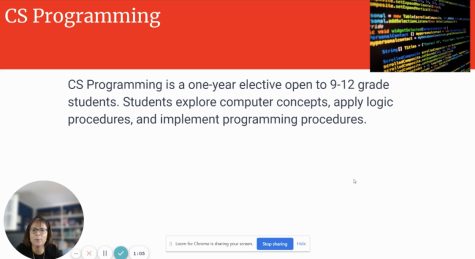 The Computer Science Programming course will combine computer science and programming courses into a single class. The course will teach students both introductory Java and Python, languages that students previously would have had to take multiple classes to learn.
The Computer Science Programming course will combine computer science and programming courses into a single class. The course will teach students both introductory Java and Python, languages that students previously would have had to take multiple classes to learn.
“Now students won’t have to choose between those two courses,” Cybersecurity Fundamentals and Programming teacher Karyn Kolly said. “The path of this one computer science course leads to the path of the other courses, [like] AP Computer Science A.”
The county originally set the course to only teach Python, but the future teachers of the course, Karyn Kolly and Lesley Frew, contacted the guidance department to request approval to teach both Python and Java. The format of the course is similar to a computer science programming class that is offered at Thomas Jefferson High School for Science and Technology (TJHSST).
“[The county] wanted us to just use Python, but Ms. Frew and I decided that would not serve the school population well,” Kolly said. “This will be an intro course that a lot of students will take…Python and Java…are both two of the most popular languages right now.”
The course is open to all grade levels and requires no prior experience. The two teachers emphasize the benefits of the course for students who both do and do not want to pursue a career in computer science and programming.
“I think everybody should take some computer science,” Kolly said. “It teaches you how to problem solve, how to work and collaborate with other students…. It’s a different way to think and it’s good for everybody to learn.”
Data Structures and Algorithms
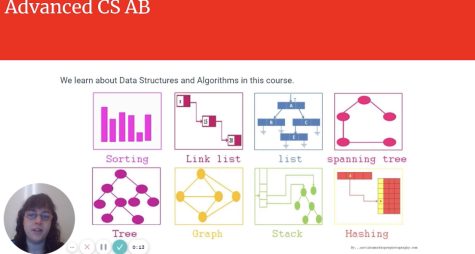 Data Structures and Algorithms will be provided through Northern Virginia Community College (NOVA) and is the first dual enrollment computer science class to be offered in FCPS. The course will replace Advanced Computer Science AB, a class available to students this year.
Data Structures and Algorithms will be provided through Northern Virginia Community College (NOVA) and is the first dual enrollment computer science class to be offered in FCPS. The course will replace Advanced Computer Science AB, a class available to students this year.
The creation of the course addresses prior issues students encountered when trying to obtain college credit for participation in Advanced Computer Science AB.
“Currently, students cannot receive college credit for taking Advanced Computer Science AB, which is a post-AP course,” programming teacher Lesley Frew said. “This course used to be called AP Computer Science AB, but the AP test is no longer offered. Not all colleges offer a placement test for this course, either.”
NOVA often requires high school teachers interested in teaching dual enrollment classes to take additional courses themselves to meet eligibility requirements to teach.
“After completing 18 graduate credits in computer science through Old Dominion University as well as having my Master’s degree in Teaching from the University of Virginia, I am now qualified to teach dual enrollment computer science through Northern Virginia Community College,” Frew said.
Students will now be able to earn two semesters of college credit for the year-long course.
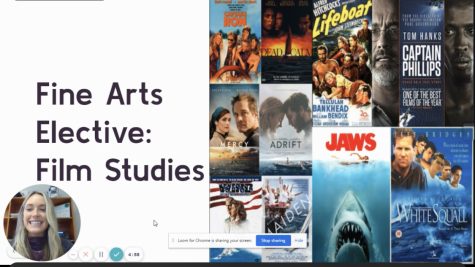 After a 10-year absence, McLean is once again offering a film studies course for students interested in analyzing, reviewing, and drawing connections between films over a range of different genres and time periods.
After a 10-year absence, McLean is once again offering a film studies course for students interested in analyzing, reviewing, and drawing connections between films over a range of different genres and time periods.
“For the class, we’re going to be covering a big look at historical cinema. I think it’s important to see the roots of how we got to where we are and we’ll be looking at different specific sets of cinematic terms that pop up,” social studies teacher Lindsay Boerger said. “We will also be looking at the rise of new Western movies … the different Marvel genres, and the rise of CGI (Computer-generated imagery).”
The class will build upon students’ reading and writing skills in an environment that emphasizes creative thinking over right-versus-wrong answers. Over the course of the year, students will be asked to consider the meaning of films as an art form.
“The film studies course next year is really going to be a comprehensive look at cinema as an art form,” Boerger said. “I love to ask the question, at the beginning of the year, ‘Does life imitate art or does art imitate life?’ This idea that, do movies influence the way that people in society behave or do people make films that reflect the way society is naturally?”
It remains unclear how county regulations regarding the maturity ratings of movies will impact the films that can be shown. The class will be available to all students, but priority will be given to upperclassmen.
“A freshman or sophomore who requests [the class] has a lesser chance of getting in than a junior or senior because they have time later on to take the class, whereas for a senior signing up, this might be their last opportunity,” Boeger said.
Students will receive year-round practice analyzing films by discussing aspects of movies that they like and dislike.
“My ultimate goal for students at the end of the year is really just for them to be able to critically talk about films,” Boeger said. “When we talk about themes, tones, moods, or genres, we’re able to actually use those terms to critically talk about film.”
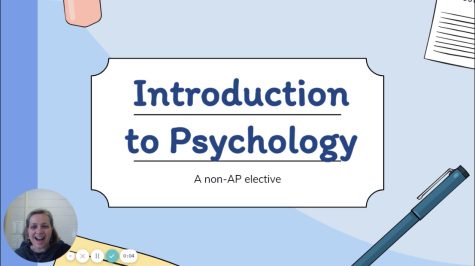 McLean is also adding back the option to take an Introduction to Psychology course, which was once offered, but was discontinued due to lack of enrollment.
McLean is also adding back the option to take an Introduction to Psychology course, which was once offered, but was discontinued due to lack of enrollment.
The addition of this new course is one that was long awaited by history teacher Katie Van Nuys, who will teach Introduction to Psychology next year.
“Almost every school in Fairfax County has an option for a Psych[ology] class that is less demanding than AP Psych[ology], but offers similar material,” Van Nuys said. “I pushed for this course to be made available to students again because so many had expressed an interest in learning about Psychology but didn’t feel as though they could handle another AP class.”
The class will cover all the basics of psychology and provide a less-extensive overview than what would be taught in the corresponding AP class. Both the AP and regular course will cover the same topics.
“We will talk about the physical stuff, like parts of the brain, and discuss psychological disorders, and how people learn and are grouped,” Van Nuys said. “It’s all realistic stuff that people will see in everyday life.”
The class requires no prerequisite and is a helpful way for students who are interested in taking AP Psychology to experience a taste of the course content.
“Psych[ology] is helpful for any field a student decides to go into, it is great to know and understand people,” Van Nuys said. “I hope [students] get excited about the content of the class, and they can learn some new things, and get answers and explanations for things that happen in real life.”
LGBTQ Perspectives in Literature
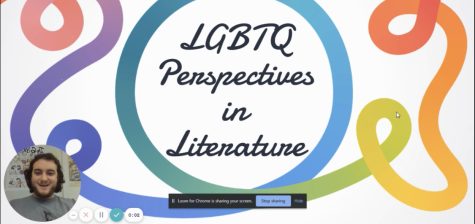 The English elective LGBTQ Perspectives in Literature is an entirely new class at Mclean. It will be taught by English teacher and McLean Gender-Sexuality Alliance sponsor Seth LeBlanc.
The English elective LGBTQ Perspectives in Literature is an entirely new class at Mclean. It will be taught by English teacher and McLean Gender-Sexuality Alliance sponsor Seth LeBlanc.
“I have had so many students over the years ask me for more LGBTQ+ literature in class, and students in GSA ask for just more diverse content in classes overall,” Leblanc said. “I think being able to address those things is important.”
LeBlanc and other FCPS teachers pushed for the addition of LGBTQ Perspectives in Literature, which was well received by the McLean administration.
“A teacher at Fairfax High School proposed the course, and myself and some other teachers helped to write the curriculum for the class,” LeBlanc said. “The McLean administration was immediately interested in offering it.”
The course is available to students in grades 10-12 and will feature a variety of LGBTQ+ literature. It will be mostly project-based and intersects with history.
“I know some students might be interested in LGBTQ literature but feel as though they can’t take the class if they personally don’t identify, but this course is available to everyone,” LeBlanc said. “There is no prerequisite, and anyone can take the class who is interested.”
LeBlanc hopes this class will provide opportunities for all students to educate themselves on the history of LGBTQ+ icons and influential events in the past.
“Students seeing themselves in what they’re reading and learning more about their community and their culture is so important,” LeBlanc said. “Also, understanding the history of it, because while it is a literature class, a lot of it will be historically focused, particularly on the LGBTQ Equality movement.”
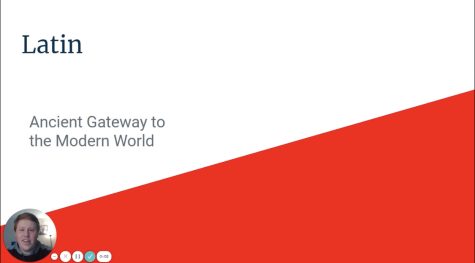 McLean added an additional Latin course to allow students who began taking Latin classes during middle school to continue taking classes all through high school. Other foreign languages, like French, already have a fifth level.
McLean added an additional Latin course to allow students who began taking Latin classes during middle school to continue taking classes all through high school. Other foreign languages, like French, already have a fifth level.
“I wanted to offer Latin 5 because I have so many students who come to McLean with a year of Latin already under their belts from Longfellow,” Latin teacher Cameron Keuning said. “Previously, once these students take AP Latin their junior year, they are done, but with the addition of Latin 5, there is now an opportunity for my students to continue studying a subject they love.”
The class is offered only to students who have previously taken AP Latin or Latin 4. The course will focus on reading, translating and discussing Latin writing from different time periods in a seminar-style class. The creation of an additional Latin class offers students the opportunity to analyze texts that Latin classes do not typically cover.
“In Latin 5, students have the opportunity to indulge their unique interests in the content of Latin literature while also improving their skills in grammar and translation,” Keuning said. “I think that students will really come away from Latin 5 surprised by the unique and exciting perspectives that Latin authors bring to the table. There is such diversity among different writers and time periods that really illustrate how deeply complex Roman culture and high society was, and how truly dynamic it was over time.”
The additional language course requires an entirely new class curriculum, making it difficult for students to gauge the texts they will be exposed to. Teachers hope that students will be drawn to the course by the opportunity it provides to apply their Latin skills and gain a deep understanding of Latin texts.
“While I don’t think there will be high demand initially, I hope that the opportunity to dive so deeply into Latin literature will increase the general interest in taking Latin,” Keuning said. “Classical literature has so many unique perspectives to offer us, and taking Latin is an excellent way to gain exposure to those.”
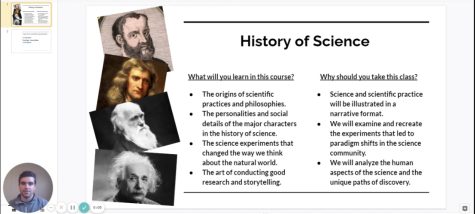 The Nature of Science will focus on teaching students about the history of scientific developments. The course helps students to draw connections between historical events and scientists’ corresponding discoveries. The class is available to upperclass students who have taken biology and chemistry.
The Nature of Science will focus on teaching students about the history of scientific developments. The course helps students to draw connections between historical events and scientists’ corresponding discoveries. The class is available to upperclass students who have taken biology and chemistry.
“The Nature of Science is a class that focuses on the history of science, the main characters who have created or discovered the science, and the means in which these individuals were able to come to their brand new conclusions,” physics teacher Billy Thomas said. “It is a new perspective on a science-oriented curriculum that focuses on the social implications of science and how science is more of a community effort than the contribution of the individual.”
Through in-depth lessons and experiments, the Nature of Science will teach students about the events that motivated scientists’ discoveries.
“The class has been propelled forward by the idea that scientific concepts can be better understood if you are aware of the circumstances in which the science has been created,” Thomas said. “If you understand what kind of person Isaac Newton was, you’d be able to see how he was able to contribute so much to the field of physics. If you understand the social hierarchy in sixteenth-century Italy, you would understand why Galileo would name his astronomical discoveries after clergymen to earn favor.”
Students participating in the course will be given the opportunity to go on field trips and perform experiments in the same way that famous scientists did in the past.
“I’m most excited to teach lessons that incorporate recreations of old experiments,” Thomas said. “We will look at the original documents shared by some scientists to their colleagues and try to recreate them in class as means of doing peer-review. You would be surprised at how simple laboratory exercises led to some of the world’s greatest discoveries.







